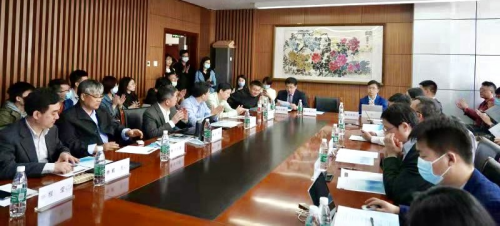On April 24, 2021, the "Legal Regulation of Internet Platform-based Blocking Practice" academic seminar was held in Room 206, Building B, Scientific Research Building of our school (Xueyuanlu Campus). TheSeminarwas co-sponsored bythe School of Juris Master in China University of Political Science and Law (CUPL), Beijing Internet Court, and the Internet Governance Research Center of CUPL.Attendants tothe seminarincluded more than 20 experts from Beijing Internet Court, Shanghai Jiaotong University, Wuhan University, Zhejiang Sci-Tech University, Nankai University, University of Chinese Academy of Social Sciences,Comparative Studiesmagazine, China Academy of Information and Communications Technology (CAICT) and other organizations. Shi Jianzhong, a Member of Expert Advisory Group of Anti-Monopoly Commission of the State Council, vice president of CUPL, and doctoral tutor, attended theseminar.

Xu Shenjian, Dean of theSchool of Juris Masterof CUPL, delivered a speech at the opening ceremony of the seminar. He expressed his sincere welcome to all the experts attending this meeting. He pointed out that in the past two or three years, the United States, the European Union, and Russia have launched antitrust investigations against Internet platform-based enterprises. In April 2021, China imposed administrative sanctions on Alibaba Group for its "either-or choice" practice, indicating that China attaches great importance to anti-monopoly issues in the field of platform economy. Internet platform-based blocking behavior is an issue of restricting competition in the field of platform economy that has attracted much attention after the "either-or choice" practice. Whether this behavior belongs to an exclusive transaction in the anti-monopoly law is controversial in the academic and practice circles. Therefore, it is necessary to conduct special research and in-depth discussion on this behavior.
Zhao Ruigang, vice president of the Beijing Internet Court, delivered a speech on behalf of the co-sponsors. He introduced the establishment and operation of the Beijing Internet Court and extended a warm welcome to all experts and scholars.
During the discussion, Wang Xianlin, Member of Expert Advisory Group of Anti-Monopoly Commission of the State Council, professor and doctoral tutor at School of Law, Shanghai Jiaotong University, Ning Lizhi, Member of Expert Advisory Group of Anti-Monopoly Commission of the State Council, professor and doctoral tutor at Wuhan University School of Law, Wang Jian, Member of Expert Advisory Group of Anti-Monopoly Commission of the State Council, Dean and Professor at Zhejiang Sci-Tech University Law School, Xu Guangyao, Professor and doctoral tutor at Law School, Nankai University, Jiao Haitao, Professor and doctoral tutor at Civil, Commercial and Economic Law School , CUPL, Han Wei, Professor at School of Law, University of Chinese Academy of Social Sciences, Dai Long, professor at School of International Law, CUPL, and Executive Director of CCCL, Chen Yongwei, Director of Research Department of "Comparative Studies" Magazine, and Researcher of Peking University Center for Market and Network Economy, Cheng Ying, research assistant of CAICT, Hao Junqi, assistant researcher of the Institute of Law, Chinese Academy of Social Sciences, and teachers fromthe School of Juris Master, CUPLas well as other experts and scholars analyzed and discussed the regulation of Internet platform-based blocking in terms of anti-monopoly law, anti-unfair competition law, e-commerce law, and contract law.

Vice President Shi Jianzhong made a summary and comment on this seminar. He stated that research on platform-based blocking should avoid generalization trends and use typological analysis; discussions on platform-based blocking practice shouldtakethe characteristics of the digital economyinto accountand pay attention to the different market characteristics of the platform economy and the traditional industrial economy. In short, the experts and scholars participating in this seminar had a comprehensive discussion on the legal regulation of the Internet platform-based blocking practice, and reached a consensus on the nature of the law and application of law. The seminar ended successfully with warm applause of all participants.